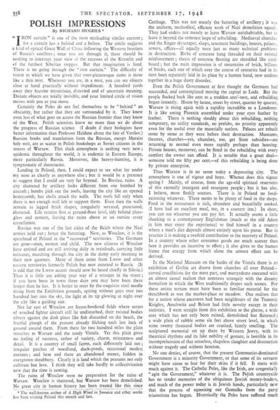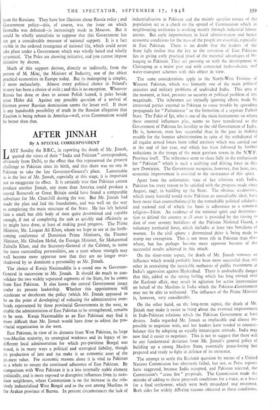POLISH IMPRESSIONS
By RICHARD HUGHES '' I " RON curtain" is one of the most misleading similes current ;
for a curtain has a behind and a before. The simile suigests a kind of optical Great Wall of China following the Western frontiers of Russia's satellites ; once you are through it, there should be nothing to interrupt your view of the recesses of the Kremlin and of the furthest Siberian steppes. But that imagination is fond. There is no going through the "iron curtain." The difficulty of vision to which we have given that over-picturesque name is more like a thin mist. Wherever you are, in a mist, you can see objects close at hand practically without impediment. A hundred yards away they become mysterious, distorted and of uncertain meaning. Distant objects are totally invisible, and your limited circle of vision moves with you as you move.
Certainly the Poles do not feel themselves to be " behind " an obscurity, but rather that they are surrounded by it. They know even less of what goes on across the Russian frontier than they know of the West. Polish scientists know no more than we do about the progress of Russian science. (I doubt if their biologists have better information than Professor Haldane about the fate of Vavilov.) Russian books and translations from the Russian, except Marxist holy writ, are as scarce in Polish bookshops as Soviet citizens in the streets of Warsaw. This thick atmosphere is nothing very new ; epidemic throughout the world, it is endemic in Eastern Europe, more particularly Russia. Moreover, like heresy-hunting, it is symptomatic of theocracies.
Landing in Poland, then, I could expect to see what lay under my nose as clearly as anywhere else ; but it would be a pretence to suggest that I could see very far beyond. In Breslau, ruins. A city shattered by artillery looks different from one bombed by aircraft ; bombs pick out the roofs, leaving the city like an opened honeycomb, but shells attack the walls. The roofs fall only when there is not enough wall left to support them. Even then the walls remain as jagged brick shapes, irregularly serrated, punctured, shattered. Life returns first at ground-floor level, tidy behind plate- glass and cement, leaving the ruins . above as an outsize crazy crenellation.
Breslau was one of the last cities of the Reich where the Nazi armies held out ; hence the battering. Now, as Wroclaw, it is the spearhead of Poland in the "recovered" territories. The Germans are gone—man, woman and child. The new citizens of Wroclaw have arrived and are still arriving daily in trainloads, carrying little suitcases, marching through the city in the damp early morning to their new quarters. Many of them come from Lwow and other eastern territories formerly Polish but now annexed to Russia. (It is odd that the Lwow accent should now be heard chiefly in Silesia.) Thus it is little use asking your way of a stranger in the street ; if you have been in town three days you may have been there longer than he has. It is better to steer by the exquisite steel needle rising from the Exhibition grounds, spiring without guys over two hundred feet into the sky, the light at its tip glowing at night over
the city like a guiding star. .
Not far east of Wroclaw are forest-bordered fields where scores of wrecked fighter aircraft still lie undisturbed, their twisted bodies silvery against the dark pines like fish discarded on the beach, the fruitful plough of the peasant already filching each last inch of ground around them. From there for two hundred miles the plain stretches to Warsaw and the sandy Vistula. Yet this plain gives no feeling of vastness, rather of variety, charm, minuteness and detail. It is a country of small farms, each differently laid out ; irregular patches of woodland, duck-ponds, occasional modest avenues ; and here and there an abandoned manor, hidden in overgrown shrubbery. Clearly it is land which the peasants not only cultivate but love. I think they will take hardly to collectivisation now that the time is coming.
The ruins of Wroclaw were no preparation for the ruins of Warsaw. Wroclaw is shattered, but Warsaw has been demolished. No great city in human history has been treated like this since
*The well-known author of A High Wind in Jamaica and other works has been visiting Poland this month and last. Carthage. This was not merely the battering of artillery ; it was the uniform, methodical, efficient work of Nazi demolition squads. They had orders not merely to leave Warsaw uninhabitable, but to leave it beyond the remotest hope of rebuilding. Mediaeval churches and the Singer skyscraper, shops, tenement buildings, houses, palaces, sewers, offices—all equally were just so many technical problems in destruction. Blobs of concrete hang threaded on their twisted reinforcement ; sheets of concrete flooring are shredded like card- board ; but the main impression is of mountains of brick, billions of bricks, each one of which over the course of centuries had in its turn been separately laid in its place by a human hand, now undone together in a huge dusty disorder.
Even the Polish Government at first thought the Germans had succeeded, and contemplated moving the capital to Lodz. But the people flocked back like ants to a trodden ants'-nest, and rebuilding began instantly. House by house, street by street, quarter by quarter, Warsaw is rising again with a rapidity incredible to a Londoner. It is like seeing Phoenix assembled under your eyes feather by feather. There is nothing shoddy about this rebuilding, nothing temporary, no utility standards, no prefabs, no priority apparently even for the useful over the materially useless. Palaces are rebuilt stone by stone as they were before their destruction. Museums, theatres, churches—yes, churches, too, get State subsidies—are returning to normal even more rapidly perhaps than housing. Private houses, moreover, can be fitted in the rebuilding with every comfort the owner can afford. It is notable that a great deal— someone told me fifty per cent.—of this rebuilding is being done by private enterprise.
Thus Warsaw is in no sense today a depressing city. The atmosphere is one of vigour and hope. Whence does this vigour spring ? Mainly, of course, from the age-old spiritual reservoirs of this eternally insurgent and resurgent people ; but it has also, I believe, more fleshly sources. There is in Poland no food- rationing whatever. There seems to be plenty of food in the shops. Food in the restaurants is rich, abundant and beautifully cooked. (I have had an excellent meal, too, in a country inn.) In short, you can eat whatever you can pay for. It actually seems a little shocking to a contemporary Englishman (much as the old Adam in him may enjoy the experience) to find himself in a country where a man's diet depends almost entirely upon his purse. But in practice it is making a twofold contribution to the recovery of Poland. In a country where other consumer goods are much scarcer than here it provides an incentive to effort ; it also gives to the human frame that energy from which alone the utmost effort can be derived.
In the National Museum on the banks of the Vistula there is an exhibition of Gothic art drawn from churches all over Poland— carved crucifixions for the most part, and martyrdoms executed with an almost casual realism that contrasts strangely with the dreamy formalism in which the West traditionally drapes such scenes. For these artists torture must have been as familiar material for the sketchbook as was the market-place or meadow. One realises that for a nation whose ancestors had been neighbours of the Teutonic Knights, Auschwitz and Belsen had. little novelty except in their statistics. I went straight from this exhibition to the ghetto, a vVide area which has not only been ruined, demolished but flattened ; a wide plain of rubble some six feet above street level, in which some twenty thousand bodies are crushed, faintly smelling. The sculptured memorial set up there by Western Jewry, with its theatrical rhythms and its fake nobility of gesture, is horrible in its incomprehension of that senseless, shapeless slaughter and destruction without tragedy and without heroism.
No one.denies, of course that the present Communist-dominated Government is a minority Government, or that some of its servants might have cause to fear for their skins if it fell. It starts with much against it. The Catholic Poles, like the Irish, are congenitally " agin the Government," whatever it is. The Polish countryside has no tender memories of the ubiquitous Jewish' money-lenders, and much of the power today is in Jewish hands, particularly now that the process of squeezing out Gomulka from the party triumvirate has begun. Historically the Poles have suffered much from the Russians. They have few illusions about Russia today ; and Government policy—this, of course, was the issue on which Gomulka was defeated—is increasingly made in Moscow. But it would be wholly unrealistic to suppose that this Government has not got a considerable measure of national support. It is a fact visible in the ordered resurgence of national life, which could never take place under a Government which was wholly hated and wholly tyrannical. The Poles are showing initiative, and you cannot impose initiative by decree.
Much of this support derives, directly or indirectly, from the person of M. Minc, the Minister of Industry, one of the ablest practical economists in Europe today. But its mainspring is simpler, if more melancholy. Almost every political choice in Poland's history has been a choice of evils ; and this is no exception. Whatever Russia has done or does to arouse Polish hatred, it pales beside what Hitler did. Against any possible question of a revival of German power Russian domination seems the lesser evil. If there is any hundredth possibility of truth in the Russian allegation that Fascism is being reborn in America—well, even Communism would be better than that.



































 Previous page
Previous page